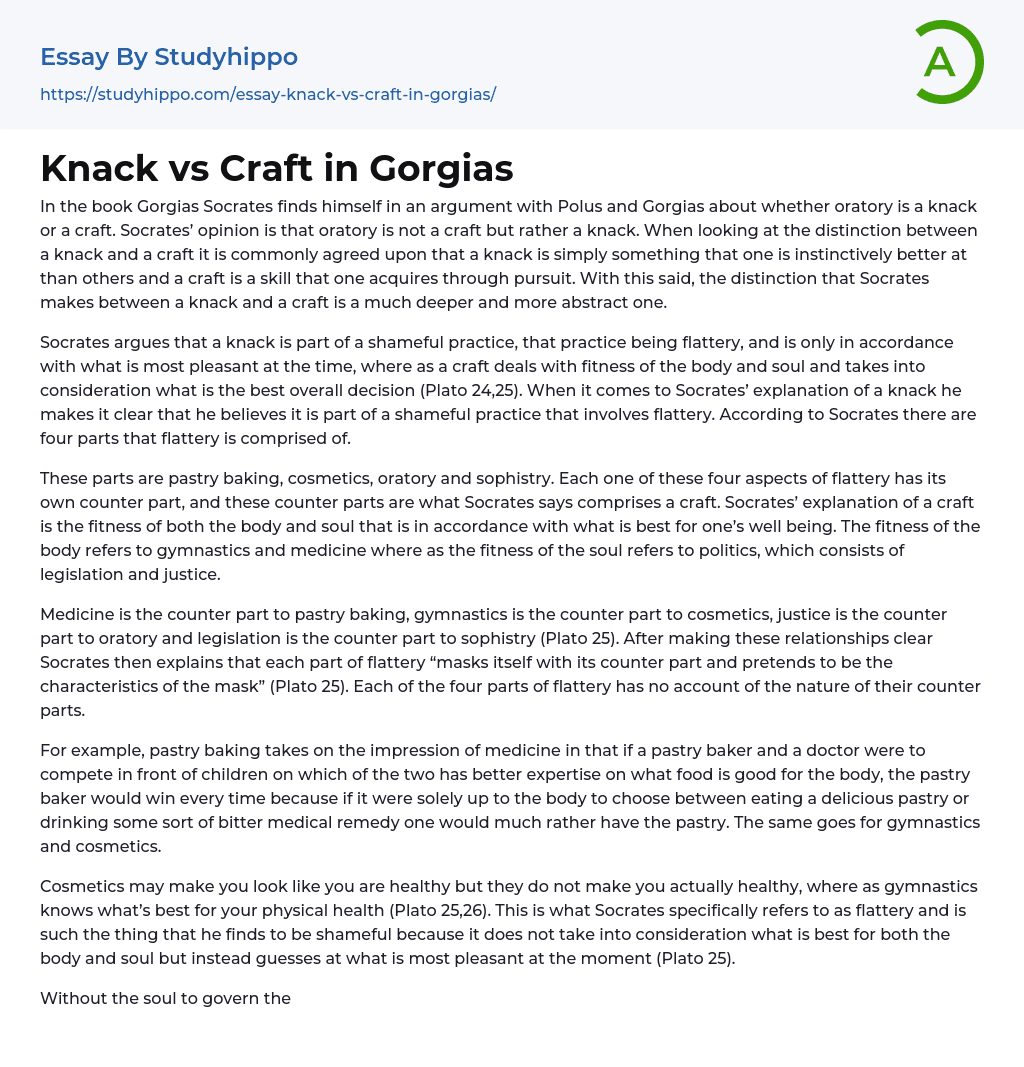In the book Gorgias Socrates finds himself in an argument with Polus and Gorgias about whether oratory is a knack or a craft. Socrates’ opinion is that oratory is not a craft but rather a knack. When looking at the distinction between a knack and a craft it is commonly agreed upon that a knack is simply something that one is instinctively better at than others and a craft is a skill that one acquires through pursuit. With this said, the distinction that Socrates makes between a knack and a craft is a much deeper and more abstract one.
Socrates argues that a knack is part of a shameful practice, that practice being flattery, and is only in accordance with what is most pleasant at the time, where as a craft deals with fitness of the body and soul and takes into consideration wh
...at is the best overall decision (Plato 24,25). When it comes to Socrates’ explanation of a knack he makes it clear that he believes it is part of a shameful practice that involves flattery. According to Socrates there are four parts that flattery is comprised of.
These parts are pastry baking, cosmetics, oratory and sophistry. Each one of these four aspects of flattery has its own counter part, and these counter parts are what Socrates says comprises a craft. Socrates’ explanation of a craft is the fitness of both the body and soul that is in accordance with what is best for one’s well being. The fitness of the body refers to gymnastics and medicine where as the fitness of the soul refers to politics, which consists of legislation and justice.
Medicine is the counter
part to pastry baking, gymnastics is the counter part to cosmetics, justice is the counter part to oratory and legislation is the counter part to sophistry (Plato 25). After making these relationships clear Socrates then explains that each part of flattery “masks itself with its counter part and pretends to be the characteristics of the mask” (Plato 25). Each of the four parts of flattery has no account of the nature of their counter parts.
For example, pastry baking takes on the impression of medicine in that if a pastry baker and a doctor were to compete in front of children on which of the two has better expertise on what food is good for the body, the pastry baker would win every time because if it were solely up to the body to choose between eating a delicious pastry or drinking some sort of bitter medical remedy one would much rather have the pastry. The same goes for gymnastics and cosmetics.
Cosmetics may make you look like you are healthy but they do not make you actually healthy, where as gymnastics knows what’s best for your physical health (Plato 25,26). This is what Socrates specifically refers to as flattery and is such the thing that he finds to be shameful because it does not take into consideration what is best for both the body and soul but instead guesses at what is most pleasant at the moment (Plato 25).
Without the soul to govern the body the world would not know what is best for it. This is what makes a knack undesirable and shameful. What Socrates is ultimately saying is that flattery is deception and that
is exactly what oratory is. Socrates’ argument about oratory being a knack, and a knack being part of a shameful practice, is backed up by his premises and thus makes his argument valid. The premises consisted of the four parts of flattery and each of their counter parts that are found in a craft.
After he explains the four parts of both a knack and a craft he explains how a knack is only what is best for the time being, where as a craft truly knows what is best for both the body and soul. He concludes by saying how oratory is a knack in that it is a shameful practice because it does not consider what is best for one’s well being and instead uses its deceitfulness, just like the other parts of flattery, in order to pretend to be what is best when it is actually only what is pleasant at the time and is what you want to hear at the moment.
- Boo Radley essays
- Genesis essays
- Richard iii essays
- Alice in Wonderland essays
- On the road essays
- Ozymandias essays
- The Nightingale essays
- Holden Caulfield essays
- Animal Farm essays
- 1984 essays
- A Hanging essays
- Shooting An Elephant essays
- A Tale Of Two Cities essays
- Adventures Of Huckleberry Finn essays
- Arthur Conan Doyle essays
- Brave New World essays
- Characters In Hamlet essays
- Characters In Romeo And Juliet essays
- Desdemona essays
- Diary Of A Wimpy Kid essays
- First-Person Narrative essays
- Frankenstein essays
- Heart Of Darkness essays
- Jane Eyre essays
- Jay Gatsby essays
- King Duncan essays
- Librarian essays
- Little Red Riding Hood essays
- Lord Of The Flies essays
- Silas Marner essays
- The Cask Of Amontillado essays
- The Catcher In The Rye essays
- The Crucible essays
- The Handmaid's Tale essays
- The Reader essays
- Virgil essays
- Wuthering Heights essays
- Candide essays
- Castle essays
- J. D. Salinger essays
- Ulysses essays
- Ethan Frome essays
- In Cold Blood essays
- Outliers essays
- Tuesdays With Morrie essays
- The Art of War essays
- Wife of Bath essays
- Huckleberry Finn essays
- The Lady With The Dog essays
- Great Expectations essays




